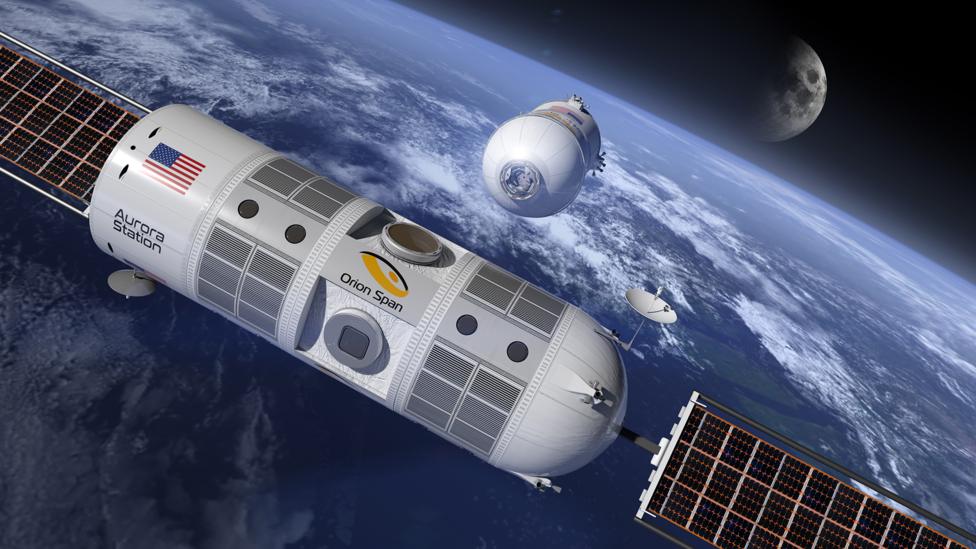 The Aurora Station by Orion Span is reportedly under development to house space tourists in the future. (Image via BBC.com)
The Aurora Station by Orion Span is reportedly under development to house space tourists in the future. (Image via BBC.com)
Rent a room in the sky, space hotel competes for orbital services
Since 2001 when the U.S multimillionaire Dennis Tito became the first non-astronaut man to ever board the Soyuz Rocket traveling the International Space Station (ISS) for US$20 million, the hotel tycoons began to realize that space hotel will be the next hot thing.In June, NASA announced that in early 2020, it would allow two persons a year to travel the ISS for US$35,000 per night. Their stay is limited to no later than a month.
With the idea of developing a purpose-built space station, which is a hotel, many companies are struggling to get people to rent a room in the orbit where they can rest while gazing at the view of the Earth.
At least, that is what the sales pitch says about the space hotel.
For example, two companies, Orion Span and Gateway Foundation, are pitching up their tents on the orbital holiday business.
Orion Span, with its capsule-sized Aurora Station, is looking forward to taking more guests on it by 2024. For the leisure activity, Orion Span promises the visitors can enjoy the earthly activities and partake in scientific experiments. The company revealed that 30 people had already put in US$80,000 deposit for a seat.
On the other hand, the California-based Gateway Foundation is developing a wheel-shaped space station to house more than 400 people in it, including space tourists, set to be completed by 2028. The space station will be solar-powered and have artificial gravity that is one-sixth of Earth’s gravity.
THE HURDLES OF SPACE HOTELIERS
However, this orbital holiday business has its drawbacks too. To launch these space stations is astronomically expensive. Take note that NASA needs to pay Boeing and SpaceX US$50 million per seat to launch its astronauts to space. To tackle the cost, more competition and a “jump in technology” are required.
Besides the price, the law also questions the motive. Space law experts pointed out that these space hotel businesses need permission to blast off the tourists into space, including taking the responsibility if the tourists-filled rocket somehow crashed or failed to launch.
That means more works for the governments as they also need to supervise the orbital activities. Therefore, the governments wary of supporting such projects.
The 1967 Outer Space Treaty, indeed, bans all countries to claim any orbital or celestial object as its own. However, they are allowed to use any these space objects for “peaceful” purposes; hence, making way for a lucrative business.
Some businesspeople asserted that the treaty has been outdated and problematic for some space hoteliers, and its context was not meant for ballistic weaponry in space, rather than space holiday. They called for the government to acknowledge that the enthusiasm of Earth people to visit space has been a lot higher since the Apollo era.
Source: https://bit.ly/38dLHjJ
 English
English Japan
Japan

cialis once a day dosing supplements to enhance female libido herb viagra cost of cialis at walmart cialis 5mg tablets reviews pfizer patient assistance form
best generic cialis pills viagra triangle chicago sildenafil citrate 100mg coupons new fda approved diet drug 100% male pills cialis 30 tablet trial viagra history taking 300 mg of viagra granuflo mixer viagra next day fedex viagra meaning natural viagra ingredients non fda approved medications best libido supplement for men viagra en ligne how much viagra can i take walgreens diet pills that work eli lilly internships instant natural viagra medication classification list generic super p force viagra rebate coupons buying viagra tadalafil generic vs cialis reviews generic cialis for daily use viagra otc generic cialis 5 mg daily tadalafil made in india how to take viagra for maximum effect compra viagra 50 mg sildenafil cialis tadalafil 20 mg tablets
over the counter erectile pills at walgreens miralax samples predoxen at walmart viagra jokes non fda approved medications walgreens nugenix viagra plus 400 mg
viagra costs at walmart revatio for bph viagra for women pink pill natural viagra free samples for healthcare professionals sildenafil daily dose
best price 100mg generic viagra how to use cialis 20mg walgreens 30% photo citrato de sildenafila walmart year end prescription report male enhancement procedures